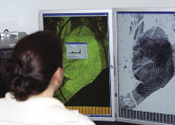Questioned Documents
Questioned Documents
Mission
The Questioned Documents Unit (QDU) provides forensic support to the FBI and federal, state, and local law enforcement agencies by conducting forensic examinations on evidence collected during an investigation. This is accomplished through written reports that contain results of examinations and technical information relating to the evidence and by providing expert testimony concerning information and opinions contained in the reports, when required. The QDU also provides training to federal, state, and local forensic examiners on specialized technical topics in the forensic document discipline and assists law enforcement by providing information and presentations concerning the capabilities of the QDU and forensic document discipline in general. The QDU monitors, develops, and provides information to legal, investigative, and forensic personnel on legal issues and assists other forensic document examiners in formulating written examination guidelines to standardize procedures.
The Team
Document analysts (forensic examiner) and a management and program assistant
The Work
Document Examinations - Examine and compare data appearing on paper, including handwriting, hand printing, typewriting, printing, erasures, alterations, indented writing, and obliterations.
Shoe Print Database
- Maintain the database which consists of a collection of sole and heel designs and enables users to determine the manufacturer of shoes from prints or impressions left at crime scenes. QDU personnel also examine shoeprint and tire tread impressions.
- Examine and match torn or perforated edges of items, such as paper and stamps;
- Examine and analyze typewriter ribbons, photocopiers, facsimiles, graphic arts, and plastic bags;
- Maintain the Anonymous Letter File, the Bank Robbery Note File, the National Fraudulent Check File, and the Watermark File. These computerized files contain images of ransom notes, extortion letters, and other anonymous communications that assist examiners in the association of questioned documents from different cases with a common source. These databases have been extremely effective against crime committed across state lines.
- Testify in legal proceedings.







